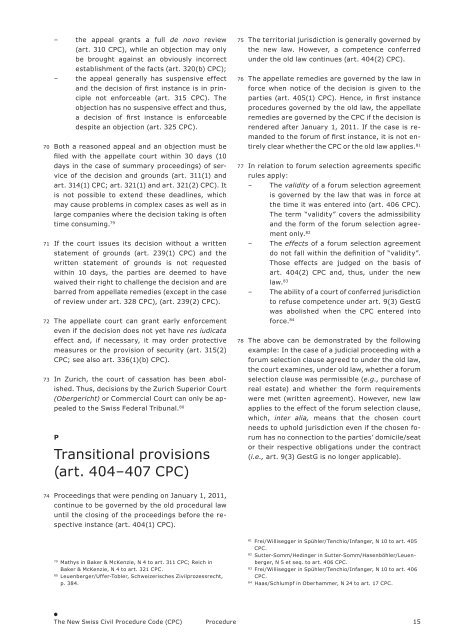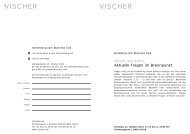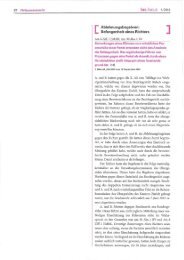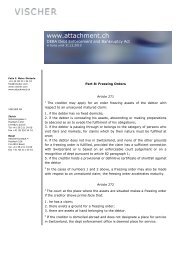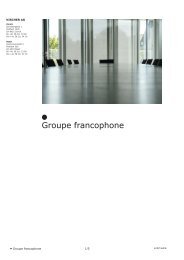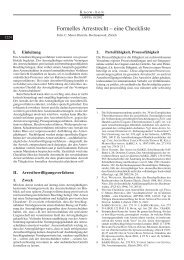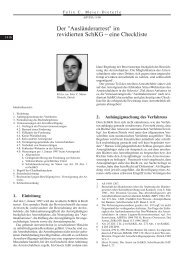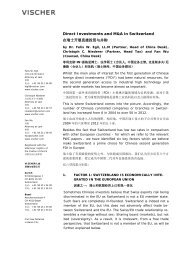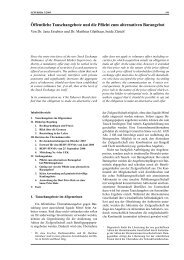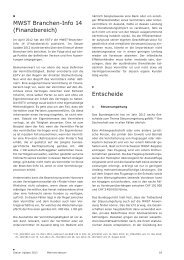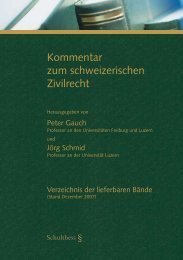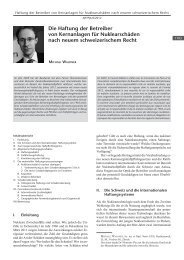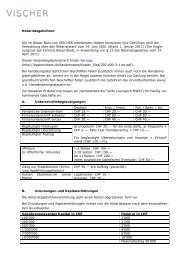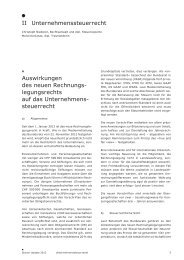The New Swiss Civil Procedure Code (CPC) - Vischer
The New Swiss Civil Procedure Code (CPC) - Vischer
The New Swiss Civil Procedure Code (CPC) - Vischer
Create successful ePaper yourself
Turn your PDF publications into a flip-book with our unique Google optimized e-Paper software.
– the appeal grants a full de novo review<br />
(art. 310 <strong>CPC</strong>), while an objection may only<br />
be brought against an obviously incorrect<br />
establishment of the facts (art. 320(b) <strong>CPC</strong>);<br />
– the appeal generally has suspensive effect<br />
and the decision of first instance is in prin-<br />
ciple not enforceable (art. 315 <strong>CPC</strong>). <strong>The</strong><br />
objection has no suspensive effect and thus,<br />
a decision of first instance is enforceable<br />
despite an objection (art. 325 <strong>CPC</strong>).<br />
70 Both a reasoned appeal and an objection must be<br />
filed with the appellate court within 30 days (10<br />
days in the case of summary proceedings) of ser-<br />
vice of the decision and grounds (art. 311(1) and<br />
art. 314(1) <strong>CPC</strong>; art. 321(1) and art. 321(2) <strong>CPC</strong>). It<br />
is not possible to extend these deadlines, which<br />
may cause problems in complex cases as well as in<br />
large companies where the decision taking is often<br />
time consuming. 79<br />
71 If the court issues its decision without a written<br />
statement of grounds (art. 239(1) <strong>CPC</strong>) and the<br />
written statement of grounds is not requested<br />
within 10 days, the par ties are deemed to have<br />
waived their right to challenge the decision and are<br />
barred from appellate remedies (except in the case<br />
of review under art. 328 <strong>CPC</strong>), (art. 239(2) <strong>CPC</strong>).<br />
72 <strong>The</strong> appellate court can grant early enforcement<br />
even if the decision does not yet have res iudicata<br />
effect and, if necessary, it may order protective<br />
measures or the provision of security (art. 315(2)<br />
<strong>CPC</strong>; see also art. 336(1)(b) <strong>CPC</strong>).<br />
73 In Zurich, the court of cassation has been abol-<br />
ished. Thus, decisions by the Zurich Superior Court<br />
(Obergericht) or Commercial Court can only be ap-<br />
pealed to the <strong>Swiss</strong> Federal Tribunal. 80<br />
P<br />
Transitional provisions<br />
(art. 404–407 <strong>CPC</strong>)<br />
74 Proceedings that were pending on January 1, 2011,<br />
continue to be governed by the old procedural law<br />
until the closing of the proceedings before the re-<br />
spective instance (art. 404(1) <strong>CPC</strong>).<br />
79 Mathys in Baker & McKenzie, N 4 to art. 311 <strong>CPC</strong>; Reich in<br />
Baker & McKenzie, N 4 to art. 321 <strong>CPC</strong>.<br />
80 Leuenberger/Uffer-Tobler, Schweizerisches Zivilprozessrecht,<br />
p. 384.<br />
<br />
<strong>The</strong> <strong>New</strong> <strong>Swiss</strong> <strong>Civil</strong> <strong>Procedure</strong> <strong>Code</strong> (<strong>CPC</strong>) <strong>Procedure</strong><br />
75 <strong>The</strong> territorial jurisdiction is generally governed by<br />
the new law. However, a compe tence conferred<br />
under the old law continues (art. 404(2) <strong>CPC</strong>).<br />
76 <strong>The</strong> appellate remedies are governed by the law in<br />
force when notice of the decision is given to the<br />
parties (art. 405(1) <strong>CPC</strong>). Hence, in first instance<br />
procedures gov erned by the old law, the appellate<br />
remedies are governed by the <strong>CPC</strong> if the decision is<br />
rendered after January 1, 2011. If the case is re-<br />
manded to the forum of first instance, it is not en-<br />
tirely clear whether the <strong>CPC</strong> or the old law applies. 81<br />
77 In relation to forum selection agreements specific<br />
rules apply:<br />
– <strong>The</strong> validity of a forum selection agreement<br />
is governed by the law that was in force at<br />
the time it was entered into (art. 406 <strong>CPC</strong>).<br />
<strong>The</strong> term “validity” covers the admissibility<br />
and the form of the forum selection agree-<br />
ment only. 82<br />
– <strong>The</strong> effects of a forum selection agreement<br />
do not fall within the definition of “validity”.<br />
Those effects are judged on the basis of<br />
art. 404(2) <strong>CPC</strong> and, thus, under the new<br />
law. 83<br />
– <strong>The</strong> ability of a court of conferred jurisdiction<br />
to refuse competence under art. 9(3) GestG<br />
was abolished when the <strong>CPC</strong> entered into<br />
force. 84<br />
78 <strong>The</strong> above can be demonstrated by the following<br />
example: In the case of a judicial proceeding with a<br />
forum selection clause agreed to under the old law,<br />
the court examines, under old law, whether a forum<br />
selection clause was permissible (e.g., purchase of<br />
real estate) and whether the form requirements<br />
were met (written agreement). However, new law<br />
applies to the effect of the forum selection clause,<br />
which, inter alia, means that the chosen court<br />
needs to uphold jurisdiction even if the chosen fo-<br />
rum has no connection to the parties’ domicile/seat<br />
or their respective obli gations under the contract<br />
(i.e., art. 9(3) GestG is no longer applicable).<br />
81 Frei/Willisegger in Spühler/Tenchio/Infanger, N 10 to art. 405<br />
<strong>CPC</strong>.<br />
82 Sutter-Somm/Hedinger in Sutter-Somm/Hasenböhler/Leuen-<br />
berger, N 5 et seq. to art. 406 <strong>CPC</strong>.<br />
83 Frei/Willisegger in Spühler/Tenchio/Infanger, N 10 to art. 406<br />
<strong>CPC</strong>.<br />
84 Haas/Schlumpf in Oberhammer, N 24 to art. 17 <strong>CPC</strong>.<br />
15


